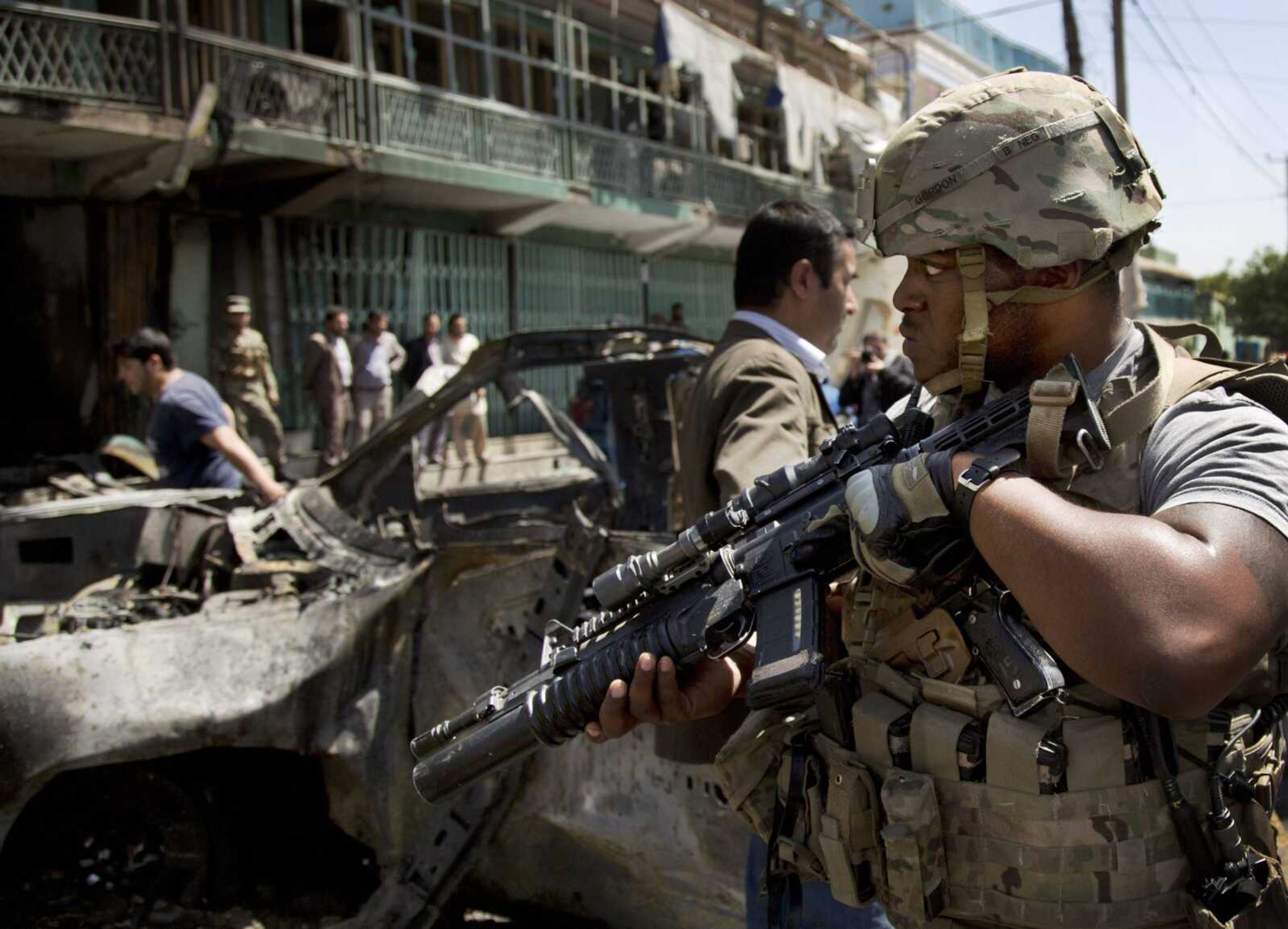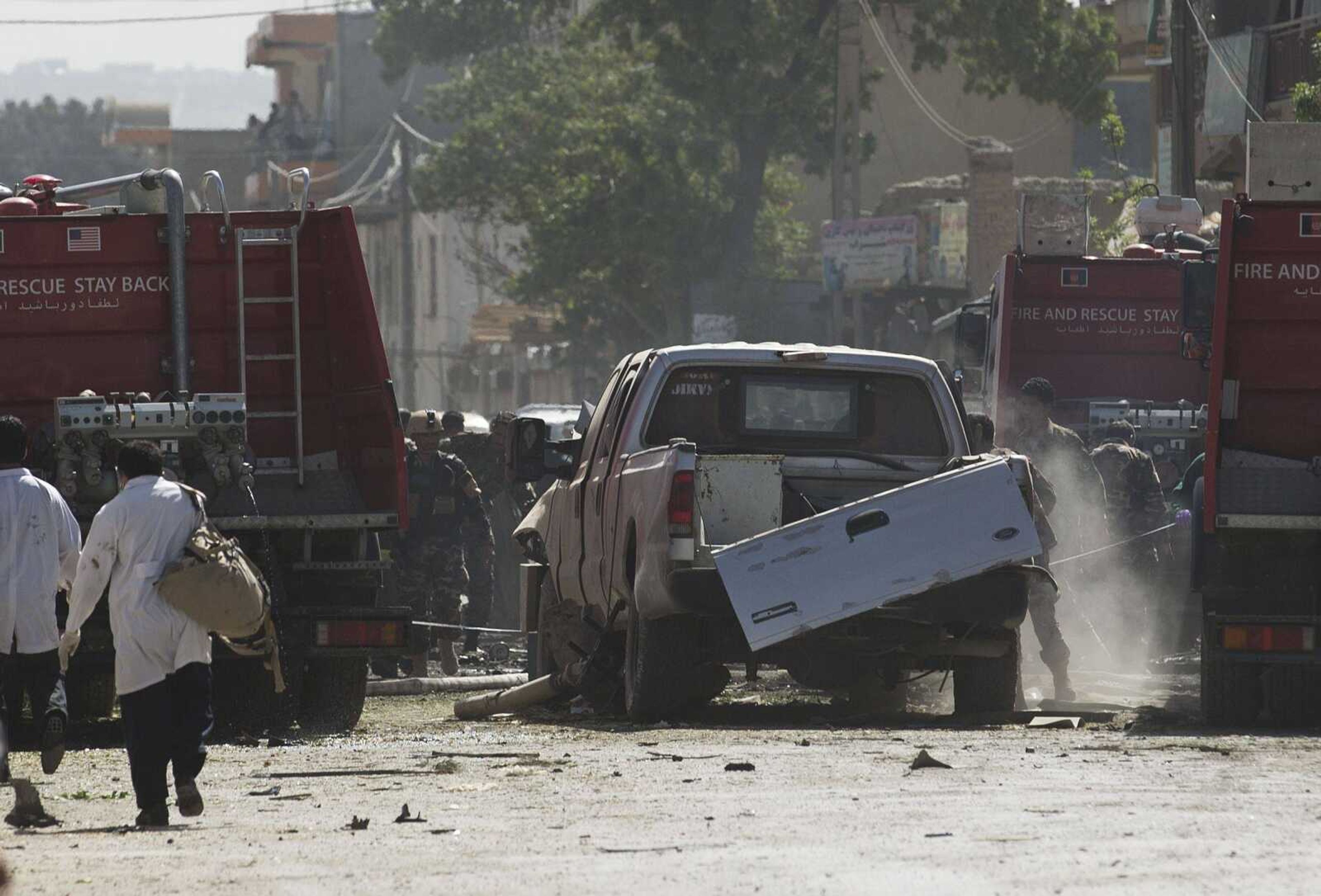Suicide bomber in Afghanistan kills 15, including 6 Americans
KABUL, Afghanistan -- A suicide car bombing tore through a U.S. convoy in Kabul on Thursday, killing at least 15 people including six Americans in a blast so powerful it rattled the other side of the Afghan capital. U.S. soldiers rushed to help, some wearing only T-shirts or shorts under their body armor...
KABUL, Afghanistan -- A suicide car bombing tore through a U.S. convoy in Kabul on Thursday, killing at least 15 people including six Americans in a blast so powerful it rattled the other side of the Afghan capital. U.S. soldiers rushed to help, some wearing only T-shirts or shorts under their body armor.
A Muslim militant group claimed responsibility for the morning rush-hour attack, saying it was carried out by a new suicide unit formed in response to reports that the U.S. plans to keep bases and troops in Afghanistan even after the 2014 deadline for the end of the foreign combat mission.
The group, Hizb-e-Islami, said its fighters stalked the Americans for a week to learn their routine before striking -- a claim that raises questions about U.S. security procedures.
Two children were among nine Afghan civilians killed in the attack.
"I can't find my children. They're gone. They're gone," their father screamed before collapsing to the ground as neighbors swarmed around to comfort him.

Two American soldiers were killed, as were four American civilian contractors with DynCorp International. DynCorp, a U.S. defense contractor based in Falls Church, Va., said its employees were working with U.S. forces training the Afghan military when the blast occurred.
It was the deadliest attack to rock Kabul in more than two months and followed a series of other assaults on Americans, even as U.S.-led forces are focusing more on training while leaving the fighting of militants to their Afghan counterparts.
Thursday's bombing pushed the monthly toll for the U.S.-led coalition to 18, making May the deadliest month so far this year. By comparison, 44 international troops were killed in the same period last year. The overall number of coalition deaths has dropped as Afghan forces increasingly take the lead.
The suicide bomber detonated his explosives-laden car at about 8 a.m. and set nearby buildings on fire. The blast left body parts scattered on the street along with the mangled wreckage of one of the U.S. vehicles.
Kabul Deputy Police Chief Daud Amin said it was difficult to count the dead.
"We saw two dead bodies of children on the ground," Amin said. "But the rest of the bodies were scattered around." Thirty-five Afghans were wounded, according to the Health Ministry.
Kabul had been experiencing a relative lull in attacks in recent weeks. The last major assault was March 9, when suicide bombers struck near the Afghan Defense Ministry while U.S. Secretary of Defense Chuck Hagel was visiting.
President Hamid Karzai condemned Thursday's attack, saying it was the work of "terrorists and enemies of Afghanistan's peace."
A spokesman for the Hizb-e-Islami militant group, Haroon Zarghoon, said one of its operatives carried out the attack on two vehicles of U.S. advisers.
Zarghoon says the organization formed a new cell to stage suicide attacks on U.S. and other coalition troops.
"The cell had been monitoring the movement and timing of the American convoy for a week and implemented the plan Thursday morning," Zarghoon said.
He said the cell was established in response to reports that the U.S. plans to keep permanent bases and troops in Afghanistan even after the NATO withdrawal.
The U.S. has said it wants no permanent bases in Afghanistan after 2014, but Afghan President Hamid Karzai raised eyebrows last week when he announced he had agreed to an American request to keep nine bases.
A small American force is expected to remain in the country to assist Afghans in keeping security, but the exact number or mission has not yet been decided.
Hizb-e-Islami is headed by Gulbuddin Hekmatyar, a 65-year-old former Afghan prime minister and onetime U.S. ally. The militia has thousands of fighters and followers in the country's north and east.
The U.S. heavily financed Hekmatyar's government during the Soviet occupation of Afghanistan in the 1980s. In recent years, Afghan and NATO troops have been trying to hunt him down. In 2010, U.S. bombs targeted his military chief, Kashmir Khan, in Kunar province; Khan was wounded but survived.
However, Hekmatyar's son-in-law has held peace talks with Karzai and American officials. Hizb-e-Islami has a political arm with a significant number of seats in parliament, though it has tried to distance itself from Hekmatyar and violence. Several of Karzai's senior aids in the past have been affiliated with Hekmatyar.
In a further sign of the complexities of the Afghan insurgency, Hizb-e-Islami also is a rival to the Taliban insurgency, although both movements share the goal of driving out foreign troops and establishing a state that would follow a strict interpretation of Islamic law.
Hekmatyar and the Taliban supreme leader, Mullah Omar, are said to be bitter personal enemies.
Thursday's attack was the second in eight months claimed by Hizb-e-Islami, the last one in September when a female suicide car bomber killed least 12 people in Kabul. At the time, Hizb-e-Islami said the attack was revenge for the film "Innocence of Muslims," which was made by an Egyptian-born American resident and infuriated Muslims for its negative depiction of the Prophet Muhammad.
Connect with the Southeast Missourian Newsroom:
For corrections to this story or other insights for the editor, click here. To submit a letter to the editor, click here. To learn about the Southeast Missourian’s AI Policy, click here.









